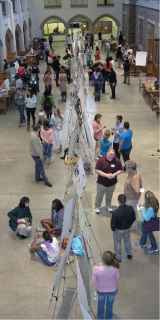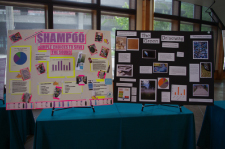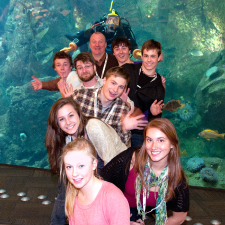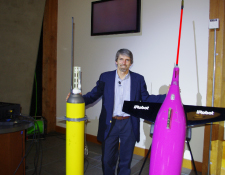COSEE-Ocean Learning Communities (COSEE-OLC) is focused on bringing cutting-edge research about the ocean out of the laboratory and into learning communities that can put that knowledge to work so that citizens become better stewards of our marine and aquatic environment. The COSEE-OLC effort is organized around four intersecting initiatives:
- Cultivate and Study a Marine Naturalist Volunteer Community
- Engage Citizens and Students in Contemporary Ocean Science Research
- Conduct and Communicate Research on Learning Science in Diverse Communities
- Conduct Inreach to Researchers, Outreach to Citizens
Among the accomplishments in our seventh year, several stand out:
- Broader impacts seminar series
- Boat-based educators’ workshop
- SoundCitizen science apprenticeship program
- Expansion of the My Place in Puget Sound curriculum for high school students
- Family science weekend and Sound Conversations speaker series
- Ocean Inquiry Project research cruises throughout 2011/12
- Conducting and publishing research on how people learn about the ocean and the environment.
Below we provide a brief update on these accomplishments.
Broader Impacts Seminar Series
Building from the one-day workshops we’ve held in the past for scientists regarding broader impacts and outreach; this year we tried a different format and developed a seminar series, Beyond the Ivory Tower: Tools and techniques to reach audiences and broaden the impacts of your research. Working in collaboration with Washington Sea Grant we held six seminars from January to June on the University of Washington campus. The seminars were designed for environmental science faculty, staff, post docs and graduate students. Topics were selected based on feedback we received from our prior workshops and included:
- What do funders really want?
- Why bother with social media? (including a hands on session for using social media)
- Best Practices for Translating Research for K-12 Audiences
- Connecting with Stakeholders: Secrets of Success
- Informing and Influencing: Sharing Your Science with Decision Makers.
After each seminar participants had the opportunity to talk with the presenter(s) and each other via a social networking gathering.
Boat-Based Education Plankton Workshop
| |  |
| High school students presenting project posters at the University of Washington |
In November COSEE-OLC partnered with Washington Sea Grant,
NANOOS (Northwest Association of Networked Ocean Observing Systems ) and
Ocean Inquiry Project to host its second Boat Based Education Citizen Science Workshop at the University of Washington. The two-day workshop began with presentations by Drs.
Julie Keister and
Robin Kodner, both UW Oceanography scientists who study plankton and are interested in citizen involvement with their research. The remainder of the day was spent out on Puget Sound on a cruise hosted by Ocean Inquiry Project to learn more about the plankton research and data collection protocols. Day two included plankton related curriculum development and modification that included sharing among the participants about plankton related activities they already do as part of their boat based programming or ways to add to it. Discussions were intentionally structured to fit within a public participatory framework so that organizations were positioned to think of themselves as long-term partners working with ocean scientists. The 26 participants and organizers left the workshop with excitement and enthusiasm for engaging in authentic science. Plans are currently under development for ongoing collaboration, opportunities for continued dialogue, and future meetings that will expand partnerships with these groups and ocean scientists.
Sound Citizen Science Apprenticeship Program (SCSA)
In 2011, we wrapped up the final iteration of the two-year apprenticeship program funded through NSF’s Opportunities for Enhancing Diversity in the Geosciences. The apprenticeship represents a direct leveraging of COSEE-OLC activities to broader audiences and directly links COSEE’s missions in education and in scientist engagement by steeping apprentice activities in cutting-edge geosciences research. Project COOL was a partnership between the University of Washington’s School of Oceanography, the UW Institute for Science and Mathematics Education and a youth group in Seattle named Passages Northwest. The first year of the project (2009-2010) brought students ages 13-17 from urban areas around Seattle to the UW campus to take part in geosciences research and mentorship experience. The second year (2010-2011) capitalized on last year’s success to work with middle school girls from diverse backgrounds in an urban neighborhood in Seattle. In the final iteration in Fall 2011, we created a quarter-long “science learning apprenticeship” during which youth were mentored by UW scientists and university students and collaborated with project staff and scientists to identify researchable questions, collect and process samples, and interpret and report the results. Eight girls worked with Rick Keil’s lab as part of the SoundCitizen Program, examining the presence of endocrine disruptors in natural and built sources of water, and creating recipes for green cosmetics.
 | |
Two of the high school posters featured at the Seattle Aquarium for World Ocean Day | |
My Place in Puget Sound High School Curriculum
For the third year COSEE-OLC, in collaboration with SoundCitizen, the University of Washington Institute of Science and Mathematics Education, and the UW Ocean and Coastal Interdisciplinary Sciences GK-12 program (OACIS GK-12), offered the high school level curricular materials, My Place in Puget Sound. The curriculum is a place-based inquiry science unit that addresses environmental issues with real and current data, is community relevant, and empowers students to act around environmental issues. The culminating event was a public poster session held in May at the UW campus, at which over 80 high school students shared their projects with fellow students, scientists, graduate students and the university community. This year a select few of the student posters were featured at the Seattle Aquarium in June for World Ocean Weekend.
Engaging a Community of Marine Naturalist Volunteers, Scientists, Educators and Citizens
| |  |
| The winning ocean science team celebrating at the awards dinner |
Throughout 2011-12 we hosted, sponsored and supported events that provided opportunities for the general public to learn more about ocean science, both locally and nationally, as well as to expand our ocean learning community. In the fall of 2011 COSEE-OLC participated in the Seattle Aquarium’s Family Science Weekend and coordinated with the University of Washington School of Oceanography scientists, graduate and undergraduate students to host activity tables. UW Oceanography graduate students provided a table with the Great Plankton Race, giving aquarium guests a hands-on opportunity to learn more about the design and life of plankton. Scientists from UW Oceanography and the
UW Applied Physics Lab provided opportunities to build and test Remote Operated Vehicles (ROVs) in a tank; and members of COSEE-OLC’s marine volunteer community and UW Oceanography undergraduate students provided Cartesian-diver and wave-in-a-bottle activities to help illustrate ocean principles. The weekend was a great success and was enjoyed by over 9000 Aquarium guests.
In the Spring COSEE-OLC participated in the Washington Regional Ocean Science Bowl – the Orca Bowl, held on the UW campus. It was an exciting day of competition involving 16 teams. The day concluded with an awards banquet held at the Seattle Aquarium.
COSEE-OLC returned this year as one of the sponsors for the Seattle Aquarium’s 2012 Sound Conversations (PDF, 3.06 MB) lecture series. Sound Conversations is a speaker series targeted to the general public as a way to introduce and inform citizens about science and research related to the health of the world’s ocean and marine life. The series format uses an informal interview-like approach to engage the speaker in a conversation about their career, work and interests. Our own Fritz Stahr (UW School of Oceanography) opened the series this year talking about his career path in Oceanography and with the Applied Physics Lab at the University of Washington, including his work with Sea Gliders and Remote Operated Vehicles (ROVs). The evening included an ROV demonstration in the aquarium’s 200,000 gallon Window on Washington Waters exhibit. Fritz also talked about the Ocean Inquiry Project, a non-profit outreach program he founded that takes students and citizens out on Puget Sound and engages them in science and research. This year’s series also included James Bodkin (USGS, Alaska Science Center), in a talk titled What Can Sea Otters Tell Us About the Ocean?, and Lynda Mapes, (Reporter, Seattle Times), discussing The Elwha River Undammed: Restoring an Ecosystem.
| |  |
| Fritz Stahr kicked off the Sound Conversations lecture series talking about his ocean science career and work with Sea Gliders and ROVs |
Ocean Inquiry Project Research Cruises
COSEE-OLC’s collaborating partner, Ocean Inquiry Project (OIP), continues to provide opportunities to integrate our communities through active field research on the water. OIP’s cruises foster an appreciation of ocean science, as well as Puget Sound, and increase awareness of our impact on the oceans for students and volunteers ranging from fifth graders to retirees. Ocean Learning Community members who have participated in OIP cruises emphasize this program for increasing respect and understanding between students, teachers, volunteers and researchers.
Learning Science and Environmental Education Research
Through the University of Washington’s Institute for Science and Math Education, COSEE-OLC continues to conduct research on how people learn about the ocean and the environment, and communicates those findings to ocean scientists, other learning scientists, and teachers.
SoundCitizen’s Move to University of Washington, Tacoma
This past Spring the SoundCitizen program moved to the Center for Urban Waters at University of Washington, Tacoma under the direction of Drs. Joel Baker and Rick Keil. SoundCitizen, a community-based water sample network that began at UW Seattle in 2008, involves local volunteers and school groups in collecting water samples from Puget Sound and other local waterways and performing a series of basic chemical tests. They then mail their samples to the Urban Waters labs to be further analyzed by undergraduate students doing research. The program tries to make the complex topic of water pollution more understandable and relevant to everyday life by testing for common cooking spices - such as testing for vanilla during the holidays - in addition to serious pollutants.
Since the program’s inception, dozens of community organizations and hundreds of individual volunteers and K-12 students have collected samples throughout Puget Sound and its in-feeding watersheds. The scientific findings illustrate strong seasonal links between household activities (cooking, cleaning etc.) and the subsequent appearance of chemical “fingerprints” of these activities in aquatic and marine environments.
Amanda Bruner, outreach coordinator for SoundCitizen, also shares an interest in increasing the number of women and minorities pursing careers in STEM-related fields. “By moving to Tacoma, we are in the unique position to create a rich network of support for STEM career pathways by connecting middle and high school youth to UW Tacoma undergraduates and faculty,” says Amanda. “We can also connect K-12 educators to the research and restoration work done by the vibrant community of scientists and engineers at the Center for Urban Waters through professional development workshops. We're also enhancing undergraduate education by creating opportunities for UW Tacoma undergraduates to conduct professional research in a state-of-the-art facility, which makes them more competitive applicants for jobs or graduate school.” SoundCitizen reaches as far down the pipeline as middle school classrooms, where the program provides hands-on science curriculum.
Visit COSEE-OLC!

